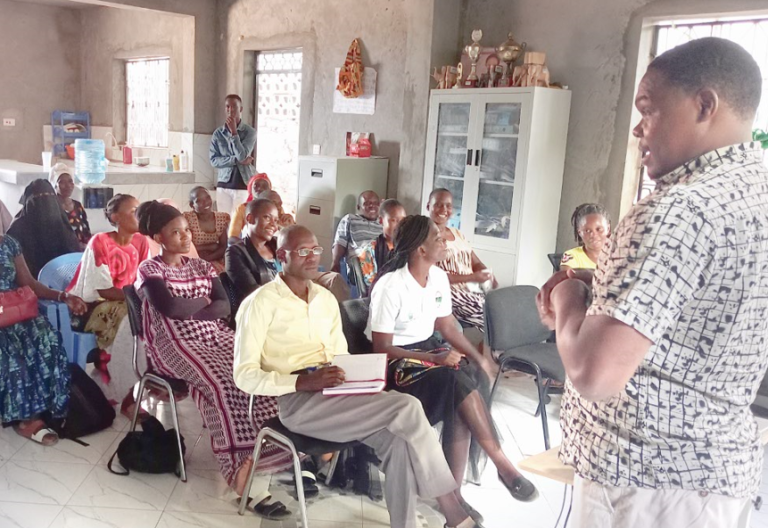Tackling teenage pregnancy menace in Kilifi villages
By Reuben Mwambingu, January 21, 2025Driving along the Kilifi-Sokoke-Ganze road, one cannot fail to notice the stark contrast in the livelihoods of the people. For those on the underprivileged side of this divide, poverty stalks them and they have been condemned to live under its cruel shadow that drives them to the very edge of existence.
In Vilwakwe, a small village in Ganze constituency, Kilifi County, the landscape tells a harrowing tale of deprivation. The bumpy, dusty roads lead visitors to a place notorious for its troubling epidemic of teenage pregnancies. It is here that we meet Mary (not her real name), a 15-year-old mother of three.
Mary’s life is a tragic reflection of the challenges faced by many girls in this region. At just 13 years of age and in Class 7, she fell pregnant after a brief relationship with a man she met while attending Kachoroni Boarding Primary School. A gift of Sh200 from the man marked the beginning of a two-month relationship that ended abruptly when she discovered she was pregnant.
When Mary shared the news, the man disappeared, leaving her to bear the burden alone. She dropped out of school to take care of her twin boys but later resumed and sat her Kenya Certificate of Primary Education (KCPE), scoring 285 marks.
Just as she was preparing to join secondary school, the father of her twins reappeared. Using the children as leverage, he wormed his way back into Mary’s life with promises of support.
However, history repeated itself. Mary became pregnant again, and the man vanished once more.
Despite attempts by Mary’s mother to seek justice by reporting the man to local authorities, the efforts proved futile.
“We went to our chief and even the chief of his village, but they just took us in circles,” Mary’s mother laments.
In this community weighed down by despair and disregard, the Safe Community Youth Initiative (SCYI) is a beacon of hope. The organisation is transforming the lives of girls and young women at risk of dropping out of school due to teenage pregnancies.
Benjamin Kahindi, the founder and CEO of SCYI, points to extreme poverty as the main barrier keeping young women from accessing quality education. After shortlisting participants and carrying out impromptu home visits to identify the most vulnerable cases, they came face-to-face with the grim reality.
Limited resources
Since its inception, the initiative has provided full scholarships to 40 needy girls, chosen from over 1,600 applicants.
“We hoped to support 200 girls, but limited resources meant we could only help 40. Thankfully, some have been supported by other organisations,” Kahindi shares.
The scholarships, part of the ‘Elimika Project’, aim to increase girls’ transition rates through secondary school and beyond. The initiative equips beneficiaries not only with education but also with the tools to break the cycle of poverty.
“My child is bright, but I couldn’t afford to send her to school. This organisation gave us hope, and now she’s chasing her dreams,” Phyllis Manjeru, a parent, happily explains.
Samuel Kambi, another beneficiary from Chakama, was raising two girls who scored over 360 marks in KCPE, but he had no resources to support them.
“Today, they’re thriving in secondary school and their future looks bright,” he beams.
Despite these successes, Kilifi South Sub-County Children’s Coordinator Meganda Michael still highlights the persistent challenges in the region.
“Cases of teenage pregnancies and child marriages remain rampant, with some perpetrators disguising themselves as religious leaders,” he explains while pointing an accusing finger at the threat of ‘Disco Matanga’, which have been blamed for teenage pregnancies.
Young mothers
“Whenever they happen at night, the following morning you will receive myriads of complaints from parents. Some will come and tell you that their daughters have been defiled, raped and impregnated,” Meganda reveals.
In Kalongoni village of Garashi area, Malindi constituency, 25-year-old Mapenzi Juliet is already a mother of four. She recalls in retrospect how Disco Matangas- night partying at either funerals or weddings -plunged her into the irrevocable journey of motherhood when she was only a 13-year-old minor.
Extreme financial constraints saw her drop out of school at Class Four and she was unable to resume classes again.
“At the Disco Matanga, a boy approached me and after exchanging pleasantries he asked how I was feeling. I shared with him my story and we became friends…he promised to help me forget all my problems and I believed him…,” recalls the mother of four.
Soon several meetings with her newly-found love would lead to pregnancy and an automatic marriage. Mapenzi however regrets the unending challenges in her early marriage.
“Unfortunately, my man is just like me because he relies on his parents…,” she says, and adds, “I am in marriage just for the sake of it”.
Though government bursaries and other initiatives exist, they are often insufficient. The SCYI has stepped in hoping to fill the gap with innovative programmes.
One such programme, the Igniting Boda Boda Giving Project, enlists motorcycle riders, often associated with perpetuating teenage pregnancies, as agents of change. Riders contribute tuition fees, school supplies, dignity kits, and food essentials to help girls return to school.
“These riders are now watchdogs, working to prevent teenage pregnancies and offering counselling to survivors of abuse,” Kahindi explains.
The organisation also runs a Life Skills Programme, which equips girls with interpersonal skills, decision-making tools, and practical knowledge to navigate life’s challenges.
“We aim to build their confidence and leadership skills to prevent exploitation and empower them to make informed decisions,” Kahindi says.
